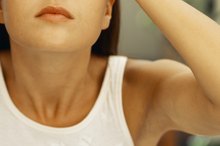What does fact checked mean?
At Healthfully, we strive to deliver objective content that is accurate and up-to-date. Our team periodically reviews articles in order to ensure content quality. The sources cited below consist of evidence from peer-reviewed journals, prominent medical organizations, academic associations, and government data.
The information contained on this site is for informational purposes only, and should not be used as a substitute for the advice of a professional health care provider. Please check with the appropriate physician regarding health questions and concerns. Although we strive to deliver accurate and up-to-date information, no guarantee to that effect is made.
Popping in the Head During Exercise
The anatomy in the head and neck is complex. Between the collection of bones, joints and blood vessels, there are a number of reasons you might experience a popping sensation during exercise. Many conditions that lead to this clicking are not serious but may be annoying. If you feel pain, experience vision changes, dizziness, nausea or a numbing sensation, consult your doctor.
If you are experiencing serious medical symptoms, seek emergency treatment immediately.
Ear Pressure
Stress or jolts can trigger popping in the ear canal. For example, when you run, your body absorbs the impact every time your foot hits the ground. The popping you hear may be coming from your middle ear. Part of the mechanism of the middle ear is to maintain equal air pressure. In other words, the pressure needs to be the same inside your ear as it is outside. The popping sound occurs as the pressure tries to equalize. This is a common occurrence and not a sign of a medical problem. You may hear the popping on one side of your head or both.
- Stress or jolts can trigger popping in the ear canal.
- In other words, the pressure needs to be the same inside your ear as it is outside.
Temporomandibular Joint Disorder
Elbow Is Snapping During Exercise
Learn More
Temporomandibular joint disorder may be causing a clicking sensation 3. TMJ indicates an inflammation in the joints that connect the jaw to your skull. As you exercise, you may be opening your mouth to breathe and the popping you feel is your jaw clicking. With TMJ, the popping will not be limited to exercise. For instances, when you chew or talk, there may be a similar click. Other symptoms of TMJ include pain just under the ear, trouble opening your mouth and headache. If you feel your jaw click when you open it, see your doctor to determine to cause of inflammation in the jaw joints.
- Temporomandibular joint disorder may be causing a clicking sensation 3.
- TMJ indicates an inflammation in the joints that connect the jaw to your skull.
Arthritis
Arthritis in the neck can lead to a popping at the base of the skull when you move your head. This problem occurs when the bony vertebrae develop rough spots or spurs. These rough edges wear down the connective tissue and discs that make up the neck. As you move your head during exercise, the bones rub together. Other symptoms of arthritis include stiffness in the neck, headaches and weakness in the arms or hands. Treatment may involve physical therapy or a neck brace.
- Arthritis in the neck can lead to a popping at the base of the skull when you move your head.
- These rough edges wear down the connective tissue and discs that make up the neck.
Considerations
TMJ Exercises for Slipped Disc
Learn More
A popping or snapping in the head can be a symptom of bleeding on the brain, or subarachnoid hemorrhage 4. Popping that immediately precedes a splitting headache and vomiting requires medical attention. Exercise elevates the blood pressure, and this may cause cerebral vascular problems. If you have high blood pressure and experience popping, stop exercising and see your doctor. If you develop a headache or problems with your vision, discontinue your routine and ask for medical help.
- A popping or snapping in the head can be a symptom of bleeding on the brain, or subarachnoid hemorrhage 4.
- If you develop a headache or problems with your vision, discontinue your routine and ask for medical help.
Related Articles
References
- "Pulse'; Some Odd Side Effects of Exercise; Sarah Joseph; 2011
- Cedars-Sinai Medical Center; Arthritis of the Neck; 2011
- Cedars-Sinai Medical Center; Temporomandibular Joint Disorder (TMJD); 2011
- Medline Plus; Subarachnoid Hemorrhage; 2011
- Powers T, Kelsberg G, Safranek S. Clinical Inquiry: Does knuckle popping lead to arthritis?. J Fam Pract. 2016;65(10):725-726.
- Dunning J, Mourad F, Barbero M, Leoni D, Cescon C, Butts R. Bilateral and multiple cavitation sounds during upper cervical thrust manipulation. BMC Musculoskelet Disord. 2013;14:24. doi:10.1186/1471-2474-14-24
- Bureau NJ. Sonographic evaluation of snapping hip syndrome. J Ultrasound Med. 2013;32(6):895-900. doi:10.7863/ultra.32.6.895
- Johns Hopkins Medicine. Ligament Injuries to the Knee.
Writer Bio
Writing since 1999, Darla Ferrara is an award-winning author who specializes in health, diet, fitness and computer technology. She has been published in "Mezzo Magazine" and Diet Spotlight, as well as various online magazines. Ferrara studied biology and emergency medical technology at the University of Nebraska and Southeast Community College.









